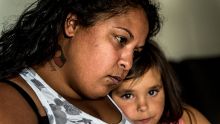Numbers can paint a vivid picture of how a nation has changed.
A century ago the average Aussie was a 24-year-old male farmer. Fifty years ago it was a 29-year-old male office clerk. But today it's a 38-year-old female sales assistant.
More National News Videos
Australia reaches population milestone
Earlier this year, statistics confirmed what we already knew, Australia's population is rapidly growing; but you might be surprised to learn which city will be our biggest by 2050.
Let's call our typical Aussie Rebecca – that was the most popular name for girls born in 1979 (it was Michael for boys).
She is married and lives with her husband and two children, a boy and a girl aged nine and six, in a stand-alone house with three bedrooms in a suburb of one of Australia's capital cities. They have a pet.

Rebecca completed year 12, has a Certificate in Business and Management and is employed as a sales assistant – the nation's most common occupation for women and men these days. She does 32 hours of paid work each week (the average is 41 hours for men) and another five hours or more unpaid work around the house. The household's annual disposable income is $88,500 (after tax). Rebecca takes five days of sick/carers leave each year and 16 days of annual leave.
Demographer Mark McCrindle estimates that Rebecca's family has lived in the house for five years and is paying off a mortgage. They have $427,847 equity in the property, which is the bulk of the family's wealth. They have another $65,880 worth of household possessions such as furniture and equipment.
Rebecca was born in Australia – despite our cultural diversity the average Australian was born here, as were both of their parents. But it's a very different story in some parts of our big cities. In Sydney's Haymarket for instance, 88 per cent of the population were born overseas.
Rebecca's household has two cars which each travel an average of 14,000 kilometres a year. Over the past 40 years the share of households with two or more motor vehicles has doubled, from 26 per cent to around 54 per cent. Like 69 per cent of all commuters, Rebecca drives to work.
Despite the growing proportion of Australians with no religion, or a non-Christian religious affiliation, Rebecca is a Catholic and speaks only English at home. She has "English, Australian, Irish, or Scottish ancestry" according to the Bureau of Statistics.
Rebecca is 164cm tall and weighs 68kg (the average man is 178cm and weighs 85kg). She exercises three times a week and gets 7.2 hours of sleep per night.
Rebecca can expect to live until 85.3 years – about four years more than her male counterparts.
Mr McCrindle said demographic averages shed light on Australia's collective "personality".
"These statistics show we are working hard, we are saving hard and we are juggling multiple roles," he said.
"It points to a pretty conscientious, busy nation that is just getting on with it."















